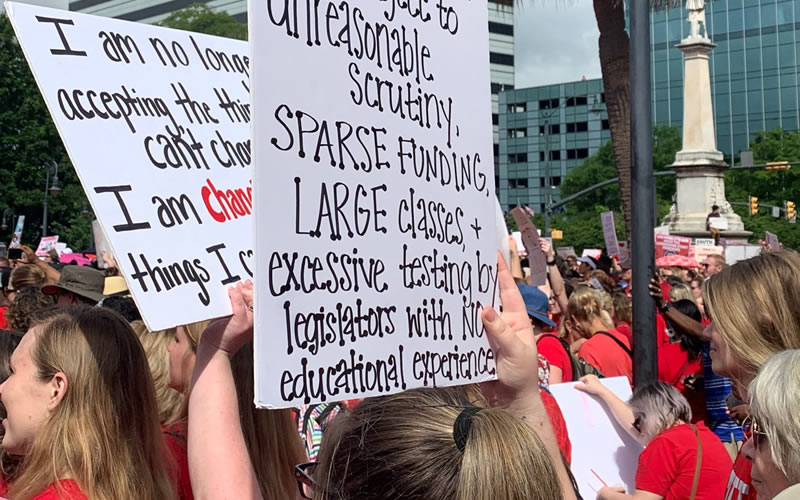
By Lindsay Street, Statehouse correspondent | Lawmakers have three legislative days left to figure out how to deal with $158.6 million in budget differences from a $1 billion surplus.
Since January, lawmakers have passed 42 laws amid the thousands filed. The most talked about effort — education — found itself waylaid until 2020. For now, the biggest thing left is approval of a $9.3 billion budget that includes a whopping $1 billion surplus.
Most differences are nominal in the state’s 2019-20 $9.3 billion spending plan. But there are some significant differences that need to be worked out because of how each chamber wants to spend the surplus:
- The House set aside $11 million but the Senate set aside $9.4 million for increasing the local government fund;
- The House set aside $11 million but the Senate set aside $6 million for increasing judicial salaries;
- The Senate set aside $25 million for farmers flood relief;
- Whether the Department of Commerce receives $85 million (House version) or $50 million (Senate version) for its Rural School District and Economic Development Closing Fund;
- The House set aside $50 million but the Senate set aside $65 million to the Department of Education for school district capital improvements;
- The Senate also set aside $20 million for a one-time bonus for state employees;
- The House would offer $50 checks per taxpayer to the tune of $35 million, but the Senate would offer $50 checks per tax return, which would cost $6 million; and,
- The House set aside $56 million for state-owned building maintenance but the Senate set aside $28 million.
Of the recurring funds, here’s some of what both bodies pledged:
- $159 million for raising the minimum teacher salary and giving 4 percent raises to teacher’s state-based salary;
- $50 million for health insurance premium increases;
- $50 million for maintaining Medicaid;
- $44 million for higher education institutions freezing tuition;
- $41 million for a 2-percent raise for state employees;
- $32 million for pension reform contribution;
- $11 million for the capital reserve fund; and,
- $10 million for S.C. Department of Disabilities and Special Needs to increase its workforce.
Of the one-time funds, here is what both bodies pledged:
- $112 million for higher education capital needs;
- $40 million for new statewide voting system;
- $37 million for state match on VA nursing home;
- $29 million on Department of Social Services Child Support Enforcement System;
- $27 million in general reserve fund;
- $22 million in state match for FEMA Hurricane Florence recovery; and,
- $10 million in prison safety upgrades.
The Senate’s to-do list
Over the past week, the Senate was embroiled in a second week of floor discussions on how to proceed with evaluating sales for state-owned utility Santee Cooper. On Thursday, senator gave second reading on H. 4287, which charges the Public Service Authority Evaluation and Recommendation Committee to evaluate bids for the utility. Under the Senate version, the state Department of Administration will evaluate bids. They are expected to take up a third reading Friday. The House and Senate will likely come to a compromise next week.
The question of Santee Cooper backed up the Senate’s 47-page calendar, which will now be addressed starting Tuesday. Big-ticket items still on the Senate’s calendar include:
- Solar promotion and industry protections (H. 3659): This major bill would lift a cap on solar energy generation reimbursement for rooftop solar customers. It also would , and mandate contract lengths between utilities and independent solar generators.
- Local government fund revisions (H. 3137): The legislation would discontinue the former approach for funding political subdivisions that is tied to the previous year’s revenues and would tie local government funding to state revenue forecasts. The funding requirement for the Local Government Fund, set at 4.5 percent of the previous year’s state general fund revenues, would be replaced with new funding requirements structured to deliver a revenue stream to counties and municipalities that is adjusted according to whether the state is projected to experience revenue growth.
- Banning female genital mutilation (H. 3973): The bill would make it a felony to mutilate the genitalia of females who are under the age of 18 or older females who are unable to consent to the procedure. The bill passed the House March 6.
To do-list for the House
The House has a significantly shorter calendar left after Thursday’s session. Here are two big issues coming up next week:
- Expanding physician assistant practice (S. 132): The bill, among many things, revises the Act to include several provisions that include expanding the responsibilities and duties of physician assistants. It passed the Senate March 21. It is now on the calendar; and,
- Ban on underage marriage (S. 196): This bill would repeal existing state law that permits an unmarried female and male under the age of 18 to get a marriage license when the female is pregnant or has borne a child. The Senate passed it Jan. 30. It is now on the calendar.
- PAST COVERAGE: Want to see more bills that have passed one body, but not the other? Here’s one we compiled a few weeks ago.
Accomplished: What has been done (so far)
 So what about the 42 laws that have actually been ratified this year? Here are some of the bigger ones:
So what about the 42 laws that have actually been ratified this year? Here are some of the bigger ones:
- Waived school days for lost days due to Hurricane Florence (H. 3929);
- Transparency for violations by student organizations at higher education institutions codified without a sunset (H. 3398);
- Extension of deadline for obtaining new voting machines and creation of an evaluation panel (H. 4157);
- Panel created for finding three finalists for a gubernatorial nomination for director of the S.C. Department of Employment and Workforce (S. 540); and,
- The hemp industry has been legalized in the state (H. 3449).
What’s left to do
The question of what to do with the sprawling, state-owned utility Santee Cooper, and how to direct and evaluate its sale will continue to loom large in the off-session. The Senate has largely pushed for a state agency to evaluate bids with leaving lawmakers the ability to vote on a winning bid. The House has pushed for a legislative panel to evaluate bids that would then be brought before lawmakers for a vote. The differences may head to conference for a fix before the session ends.
Further complicating the issue, a Senate committee voted down Gov. Henry McMaster’s nominee to chair the board of the agency, Charlie Condon, leaving the agency without a permanent leader until they reconvene to confirm another nominee.
In January, the session will pick up where it leaves off. That means items in committee remain in committee, and items on the calendar remain on the calendar.
Taxes, education and pension reform are expected to be big topics in 2020.
- Tax reform is already swirling (see our previous coverage here), and part of that will factor into further education reform, tied to property taxes. On the day the legislature adjourns — May 9 — the state Revenue and Fiscal Affairs Office is expected to release a report about education funding in the state.
- While teachers will get more pay in the new budget, the push on systemic education reform faltered this year after 15 subcommittee meetings in the Senate. The huge teacher rally on Wednesday underscored lawmakers’ inaction on items such as reducing class size and mandating duty-free breaks for teachers. Lawmakers will work on this issue over the break and into the beginning of the session.
- While pension reform was identified as a must-do by some lawmakers at the start of session, it never grew legs this session. A second phase of pension reform will likely be addressed in 2020.
One contentious item the Senate also will deal with next year is the proposed fetal heartbeat abortion ban. It passed the House last month.
Readers who weighed in on a December survey said infrastructure and climate change should be an important priority among lawmakers this session. Three bills that deal with water passed one body and are now awaiting votes in the other body:
- Water resource statewide plan (H. 4011): The bill adds a “State Water Plan” as an example of a comprehensive water resource policy in which a state agency provides assistance to the governor and General Assembly in formulating. It passed the House April 5. It is now in the Senate Agriculture and Natural Resources Committee.
- Allowance for local taxes to be used for flooding mitigation (S. 217): This bill revises provisions relating to the expenditure of the state accommodations tax, local hospitality tax and local accommodations tax. It also would allow the revenue to be expended for the control and repair of flooding and drainage at tourism-related lands or areas and for site preparation, including demolition, repair, or construction. The Senate passed the bill Jan. 23. It is now in the House Ways and Means Committee
- South Carolina Resilience Revolving Fund (S. 259): The proposed legislation would create a fund to provide low interest loans to perform flooded-home buyouts and floodplain restoration. The Senate passed it March 20. It is now in the House Ways and Means Committee.
No movement
Before session began, Statehouse Report surveyed readers on what they felt should be a priority for lawmakers. Education topped the list, but not far behind were gun reform, redistricting, campaign finance reform and expanding health care. Read the story here.
While there were bills filed on each of those topics, none advanced beyond committee.
But while no major health care bill was debated on the floor this year, the budget included a $23 million increase in the Children’s Health Insurance Plan spending to cover 20,000 more children who are not covered by Medicaid. Read more.
- Have a comment? Send to: feedback@statehousereport.com



Hi Lindsay,
Thank you for your bulletins and updates.
H4004 (Physician’s Order for Scope of Treatment) passed the House by a large margin in April and was sent to the Senate. Pretty non-controversial, I believe. How long do such bills usually take to work their way through the Senate?
Mr. Luria … from our reporter Lindsay STreet:
Thank you so much for your comment. I missed that bill in the update because I did not catch that it came out of committee April 25 and that it was indeed on the calendar.
As to your question, it’s not an easy answer. Unlike the House, which basically keeps to a chronological order when addressing bills with reports from committee, the Senate ranks items based on being contested and, if something is placed on special order, that must be addressed before anything else on the calendar. Some things move relatively fast in the Senate, and some things move at a snail’s pace. And for us outsiders it can be frustrating to try to understand.
H. 4004 is on page 29 on statewide bills and does not appear to be contested at this time (that means they could move on it quickly in the last days of session, or it could get delayed …). See the calendar here.
Thank you for being a reader, and I hope I helped!